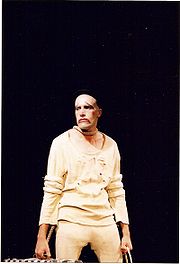.gif)
Lucky (Waiting for Godot)
Encyclopedia

Samuel Beckett
Samuel Barclay Beckett was an Irish avant-garde novelist, playwright, theatre director, and poet. He wrote both in English and French. His work offers a bleak, tragicomic outlook on human nature, often coupled with black comedy and gallows humour.Beckett is widely regarded as among the most...
's Waiting for Godot
Waiting for Godot
Waiting for Godot is an absurdist play by Samuel Beckett, in which two characters, Vladimir and Estragon, wait endlessly and in vain for someone named Godot to arrive. Godot's absence, as well as numerous other aspects of the play, have led to many different interpretations since the play's...
. He is a slave
Slavery
Slavery is a system under which people are treated as property to be bought and sold, and are forced to work. Slaves can be held against their will from the time of their capture, purchase or birth, and deprived of the right to leave, to refuse to work, or to demand compensation...
to the character Pozzo.
Lucky is unique in a play where most of the characters talk incessantly: he only utters two sentences (one of which is more than seven hundred words long; see The monologue). Lucky suffers at the hands of Pozzo willingly and without hesitation. He is "tied" (a favourite theme in Godot) to Pozzo by a ridiculously long rope in the first act, and then a similarly ridiculous short rope in the second act. Both tie around his neck. When he is not serving Pozzo, he usually stands in one spot drooling or sleeping, if he stands there long enough. His props include a picnic basket, a coat, and a suitcase full of sand.
Interpretation
Lucky's place in Waiting for Godot has been heavily debated. Even his name is somewhat elusive. Some have marked him as "lucky" because he is "lucky in the context of the play": he does not have to search for things to occupy his time, which is a major pastime of the other characters. Pozzo tells him what to do, he does it, and is therefore lucky because his actions are determined absolutely. Beckett asserted, however, that he is lucky because he has "no expectations". Another interpretation is (somewhat facetiously) that he is lucky because he has only two lines. In the French version of the play, he is known by the same name as he is in the EnglishEnglish language
English is a West Germanic language that arose in the Anglo-Saxon kingdoms of England and spread into what was to become south-east Scotland under the influence of the Anglian medieval kingdom of Northumbria...
version, rather than the French word for "lucky", Chanceux.
Lucky and Vladimir
Lucky is often compared to VladimirVladimir (Waiting for Godot)
Vladimir is one of the two main characters from Samuel Beckett's Waiting for Godot.- Personality :...
(just as Pozzo is compared to Estragon
Estragon
Estragon is one of the two main characters from Samuel Beckett's Waiting for Godot. His name is the French word for tarragon.- The impulsive misanthrope :...
) as being the intellectual, left-brained part of his character duo (i.e. he represents one part of a larger, whole character, whose other half is represented by Pozzo). Read this way, Pozzo and Lucky are simply an extreme form of the relationship between Estragon and Vladimir (the hapless impulsive and the intellect who protects him). He philosophises, like Vladimir, and is integral to Pozzo's survival, especially in the second act. In the second act, Lucky becomes mute. Pozzo mourns this, despite the fact that it was he who silenced Lucky in the first act.
The monologue
Lucky is most famous for his speech in Act I. The monologue is prompted by Pozzo when the tramps ask him to make Lucky "think". He asks them to give him his hat: when Lucky wears his hat, he is capable of thinking. The monologue is long, rambling logorrhea, and does not have any apparent end; it is only stopped when Vladimir takes the hat back. Within the gibberish Lucky makes comments on the arbitrary nature of GodGod
God is the English name given to a singular being in theistic and deistic religions who is either the sole deity in monotheism, or a single deity in polytheism....
, man's tendency to pine and fade away, and towards the end, the decaying state of the earth. His ramblings may be loosely based around the theories of the Irish
Ireland
Ireland is an island to the northwest of continental Europe. It is the third-largest island in Europe and the twentieth-largest island on Earth...
philosopher Bishop Berkeley
George Berkeley
George Berkeley , also known as Bishop Berkeley , was an Irish philosopher whose primary achievement was the advancement of a theory he called "immaterialism"...
.

